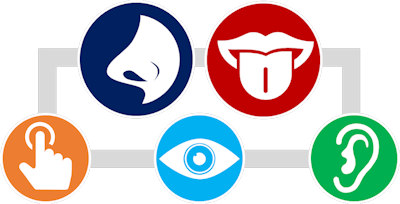Being a sensory scientist, most of my colleagues think I'm just responsible for running tests... While this is broadly correct, it's never quite so simple!

Sensory Science, as described by Herbert Stone and Joel L. Sidel is a 'scientific discipline used to evoke, measure, analyse and interpret those responses to products as perceived through sight, smell, touch, taste and hearing'.
In my opinion, this method, in some form or another, has existed for almost as long as humanity itself, especially when you consider the importance throughout history of valuing and evaluating such commodities as food, weapons, shelter and everything else which can be used and consumed.
There is no limit to the range of products that a sensory scientist may be asked to evaluate, from beverages to pet food or toilet paper to straighteners, the sheer variety of potential subjects is one of the most exciting aspects the job.
Within the FMCG category for example, manufacturers are continually aiming for that 'winning' product, each of which has its own tale of successes and failures during the development processes. The role of a sensory scientist within this cycle of innovation and renovation is to act as an interpreter between the various technical and marketing teams within a company and consumers as a whole. They regularly work with new products, prototypes or lab samples at various stages of development, helping to invent new product lines or fine tune extensions to existing offerings.
One of the key challenges faced by sensory scientists is how best to work with other parts of the business (say product developers, marketers, insights or even external clients) in order to understand their objectives and design the most appropriate test or series of tests to answer these. Once finished, a sensory scientist must then meet with these same stakeholders to ensure that they understand the outcomes and implications, using the results correctly to move the prototype closer to the finished product.
More than for many other forms of insight, the work of a sensory scientist can be an incredibly iterative process. Hundreds of prototypes maybe developed, with these whittled down to as few as 10 to 15, all of which will be put through rigorous testing and retesting with panelists prior to the hoped for launch of that all-conquering 'winning' solution.
In addition, a sensory scientist may also spend a considerable amount of time coaching other colleagues on the principles of controlled testing in order to make sure they fully appreciate the implications of such an approach. Occasionally, people do fail to understand the importance of a scientific method and while it is fine to be flexible, it is imperative that a sensory scientist is on hand to explain and communicate the associated risks before a final decision can be made.
All in all, an experienced sensory scientist will have mastered the skill needed to run such detailed sensory studies in a fast paced environment where you are restricted with resources, time and money, yet are still able to produce meaningful results that will help develop the best possible products for future!